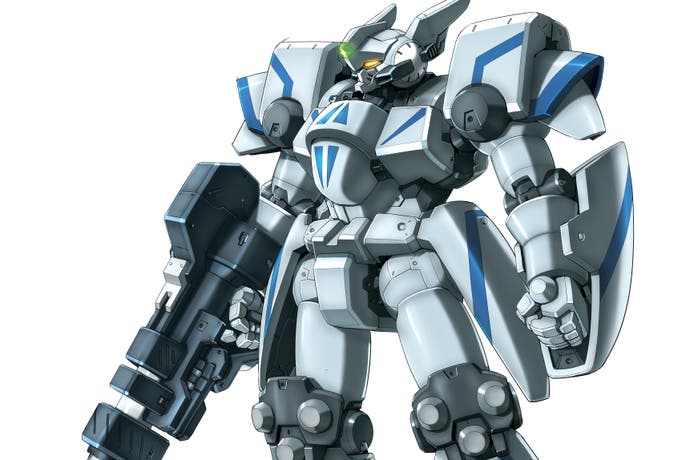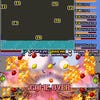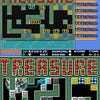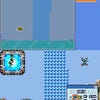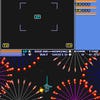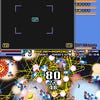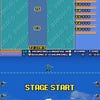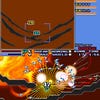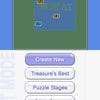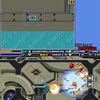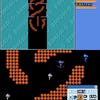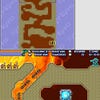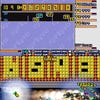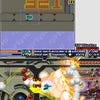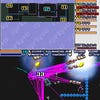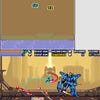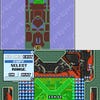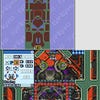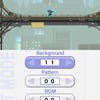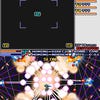Bangai-O Spirits retrospective
Attitude for gains.
Bangai-O was once destined to be a generational cast-off. It was a quirky Dreamcast hit and an obscure N64 import around the same time, so it straddled two generations pretty easily. 2008's Bangai-O Spirits made sure Treasure's demented freeform puzzle-shooter would live through another. This was fabulous news when the game was announced, but even better news was that Bangai-O Spirits wasn't seeding its continuation by adding more content or updating the graphics. It did it by blowing its entire concept wide open, removing all traditional restrictions and shipping the game with a fabulous construction kit.
Treasure's output has always exemplified the fine line between genius and madness. Behind the lushness and splendid precision of Ikaruga lies an insane conjecture - the belief that a modern shmup can be a puzzle game, but remain a shmup while doing so. It's a crazed, obsessive vision of what game mechanics can be when taken to alien extremes. However, this ability to see further than its contemporaries and translate whatever madness it finds into ridiculously good games is what makes the Treasure magic sing so brightly. It's a unique perception of which game mechanics are beautiful and how they can be whisked up into engines of delight. This makes Ikaruga, as played by a master, one of videogaming's most beautiful performances. But Treasure's uncanny flair isn't always reserved for making the gaming equivalent of Faberge Eggs.
Bangai-O has always been a far messier and chaotic affair. There's a more gleeful, wanton insanity at the heart of the Bangai-O, which seems worlds apart from Ikaruga's crystalline obsession and purity. Instead of unfolding like a magnificent clockwork, Bangai-O is more a seething pit of systems and their agents colliding to see which fireworks explode first. The early originals tempered this with a fairly standard difficulty curve and a medium pace, where there's often time to rest. Levels are more like structured mazes, and the player shoots their way through one level after another. Of course, it has a story so deliberately mental that it serves as a savage critique on stories 'for' games, but Treasure's madness is kept well under restraint and channelled without breaking too many rules. Bangai-O Spirits, however, is a far wilder beast. It's Bangai-O with the safety off and the lid not so much unfastened, but ripped off and thrown away.
The most anarchic aspect of Bangai-O Spirits is the fact that every single level can be played from first boot, and that there's no indication as to how difficult they are. A total newbie can drop into the game's most ferocious challenges entirely by accident - which happen to be some of the most stacked odds in video gaming history. From this, it's pretty clear that with Spirits, Treasure does not give a f***.
It doesn't care about a story. It doesn't care about difficulty curves and it doesn't even care about frame-rates. If you grind your DS to a halt with a last-pixel special EX attack, well done! You've made the game bully the hardware into submission. This deranged candidness is still refreshing, and the open level structure shows up XBLA's Bangai-O Missile Fury HD as being the inferior sequel (which was reflected in review scores). This is partly because its stages are locked back into plodding tradition, and it was a real shame to close Pandora's box in that way. Nailing the freeform chaos of stages like Spirits' Sabu into a tighter puzzle-oriented theme was like putting Bangai-O in a zoo to make it do tricks. But there's yet another black mark against Missile Fury HD: they took out the bat.
I still have vivid memories of the first time I used the baseball bat in Bangai-O Spirits. I nearly shrieked with delight at whacking a ball around the screen to kill things - and then I found out you could do to enemies what you did to the ball. In the midst of all the game's missiles and lasers, being able to smack ninjas around and taking out cores with three hits made that bat a constant in my arsenal.
On top of the batting is, of course, the shooting and exploding, which Bangai-O Spirits piled on with quite some vigour. A more sober reading of Bangai-O Spirits would point to the studious advances in game concepts that hallmark Treasure's two GBA updates, Advance Guardian Heroes and Gunstar Super Heroes, then note that Bangai-O Spirits does much the same with its expanded systems. On top of napalm, there's the dash and the shield, alongside the freeze and reflect EX attacks. On paper it seems so logical, in practice it feels like improv jazz. Bangai-O Spirits was a far bigger leap forward than its GBA siblings, precisely because it exterminated all rational thought about structuring a game's content (though there are hints of it in Gunstar Super Heroes). The combination of this openness with the abundance of new options for destruction makes a potent brew of freedom and chaos that few games could hope to pull off.
In terms of content, lots of Bangai-O Spirits' stages are puzzles with strict methods, but most are pliable enough to be cracked with various combinations and approaches. Gloriously, most of the stages sustain re-visits to try something different. It's a game that welcomes that sort thing for the sake of it, rather than demanding the player does it the game's way.
Of course, it's not remotely a friendly game; it's astonishingly aggressive. You might be flexing your way through space station corridors or blowing up Bangai-O cityscapes and then, suddenly, ants. Thousands of them. For three stages. Then it's back to space (to fight all the possible and incredibly terrifying bosses at once). Finding this out is part of the pleasure, and ticking them off is always satisfying - especially when a tough nut gets cracked wide open, with a suitably impressive replay saved as a result.
And then there's the level editor - a wondrous thing that's far too rare in the modern gaming landscape. Missile Fury HD might have one too, but it can't share its levels with audio files that you can play into the DS's microphone. This was an arcane link back to Bangai-O's 80s roots as Hover Attack on the Sharp X1 home computer. Legend has it Hover Attack was a type-in game that had to be saved to tape, hence the audio. Never has retro nostalgia solved a problem so ingeniously, and you can still download audio files from Treasure's page.
Back in 2008, Dave McCarthy gave Bangai-O Spirits a perfect 10. It still utterly deserves it. It's a rare thing to see: a developer running wild with the riches it's discovered and presenting something wonderfully, delightfully mad. I can't even imagine how amazing a Dynasty Warriors game with Bangai-O Spirits' approach and functionality might be. Imagine a racing game unafraid to drop you into a pro race with a top-tier car on first play, or a first-person shooter that starts at peak frenzy and expects you to work out your own means of survival.
Maybe, like me, Dave caught some of Treasure's madness in the Bangai-O Spirits maelstrom of sin, punishment and triumph. Even so, games that have the power to do this to adult minds are incredibly rare. They're more than just great games, they're transcendent experiences and perhaps in a pseudo-intellectual headspin, we can think of them as representing the true art of video games: the construction and application of interactive mechanics to create experiences.
With Bangai-O Spirits, this idea feels more tangibly valid, as the game is so visibly naked from the very first play. The prior media shackles are off and we're shown how versatile it can all be, across 160-odd canvases, any of which we can experience at any time. We can even inspect every single component, from stage elements to weapon damage, in the level editor. Treasure's resonance of madness and genius has never been so comprehensively presented and open to examination. When it's playing at full force, it has an energy that's unique, even compared to its Xbox 360 successor.
Ikaruga immortalised the Dreamcast for me, far more than the Dreamcast immortalised Treasure's brilliant shooter. To my mind, it outshone all the F355 Challenges, Power Stones and Soul Caliburs, even toppling Shenmue as the game I think makes the hardware sing as beautifully as it plays and looks. Bangai-O Spirits did the same for the DS (narrowly challenged by Ouendan). I look forward to an impossible future, where a PS4 is brought down to a stuttering one frame per second by a starburst of homing EX missiles and baseball batting a ninja across some room-filling holographic display, for if there's ever an undersung design that deserves upgrades for generations to come, it's in Bangai-O Spirits.
